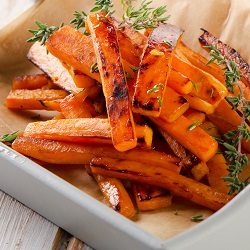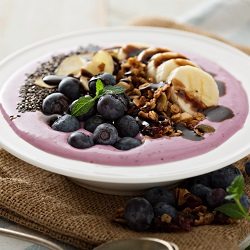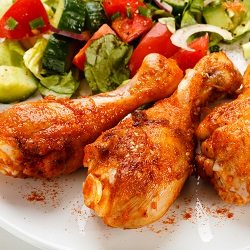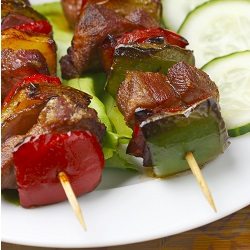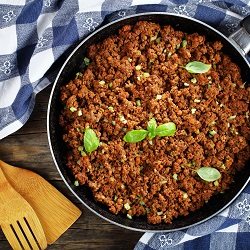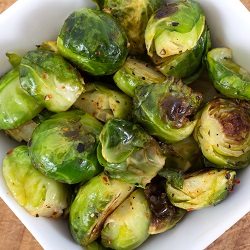Goal 3: Go organic and free range
I’m sure you have heard the phrase, “you are what you eat.” I believe that’s true – our bodies live, function, move and breathe based solely on what gets put into them. If we eat poor nutrition our body is going to start functioning poorly. However, something many people don’t think about is that you are what your food eats, too! The nutritional makeup of the meat you eat is directly influenced by what they eat. Do the cows you eat have access to fresh grass or are they stacked against each other in muddy pits fed only GMO grains? Do the eggs you eat come from chickens spending their days under sunshine, foraging for bugs and weeds or are they packed like sardines in a dark, smelly cage fed, once again, GMO grains?
Let’s take beef. Cows are naturally supposed to eat grass. This grass gets chewed and chewed, providing the ideal nutrition for the cow. They roam over the range, spending time in sunshine and developing more muscle. Conventionally raised cows spend most of their life squished with hundreds of other cows in too-small muddy pens with no access to grass. They are given corn to eat which is not a natural food for them. This, along with poor living conditions, causes nutritional problems in the cows. This leads to a high dosing of antibiotics added to the beef to ensure none of the harmful bacteria are passed along to humans. So not only are we eating less nutritious meat but now it commonly includes a dose of antibiotics which kills off good bacteria in your gut.
Grass fed (specifically, grass finished) meat is even more filling since it is more nutrient dense. This is a good thing because it is more expensive too! When compared with conventional beef, grass fed beef has less total fat, more omega-3 fatty acids, more conjugated linoleum acid (thought to reduce heart disease and cancer risks), and more antioxidant vitamins.
The way we eat, and our bodies, is a complex system where every little thing affects, and is affected by, everything else. Eating meat the way it was originally designed, or originally evolved, to be is just one more puzzle piece to get right that ends up affecting our nutrition, appetite, health at a cellular level, and so much more.
Eat organic if you can. Organic basically means that the food was not raised with any pesticides or GMO – both of which have been linked to cancer and a whole host of other problems. Our livers were made to detox us from unusable and unhealthy products like these but they can only handle so much. Once it gets overloaded it starts to deposit them in other areas of the body and some have begun to suggest this is where cancer can originate from. When you consider the amount of toxins we ingest through pollution, pesticides and even cleaning supplies, it is clear we cannot protect ourselves from it all so I try to at least limit the amount that’s on the food we eat. The less harmful toxins you put into your body the more it can focus on improving your health, increasing your energy, and strengthening your immunity.
The biggest issue with this step is the cost involved. Being convinced of the health benefits is the greatest help in overcoming that because once I realized HOW MUCH what I ate affected my health today and decreased my risk for cancer, heart disease, and you name it, cost became secondary. I started to realize that this is just how much food costs and made it a higher priority on our budget.
That being said, I know that this is not always feasible, and sometimes we have tighter months. At the minimum I try to buy the dirty dozen organic and get my chicken and eggs pastured and organic (Costco carries great prices for organic, free range chicken) as well as my ground beef. After that we may or may not be able to put the money into getting everything else organic or pasture raised but it is my goal to do that consistently one day.
Here are the big culprits:
Produce: Buy organic and local if you can (this means the produce is fresher and has loss less nutrients over time as well as being in season)
Chicken: Pasture raised and organic is best but at the minimum buy some without any added hormones or antibiotics. I haven’t yet found reasonably priced “pastured” chickens so I am still going with the just “free-range” at Costco.
Eggs: Truly pasture raised and organic, while free from soy, is ideal but these are hard to find. Getting them at your farmer’s market (ask questions!) is a good bet, otherwise the two best brands I’ve found out there are Vital Farms (truly pasture raised) and Happy Eggs (mostly pasture raised). Pasture raised is different than “free range”, which typically just means the chickens are packed like sardines in a dark pen with access to a small screened-in cement porch (if they can even make their way over there through the crowded conditions).
Beef: Grass finished (this means they are truly grass fed their whole life) and organic is ideal but shoot for at least one or the other.
Butter: This is the best part: Grass fed butter is GOOD for you! Use it as much as you want! We use it to make ghee and use that for cooking fat and bulletproof lattes. My favorite brand is Kerrygold (great price for a 3 pack at costco).

